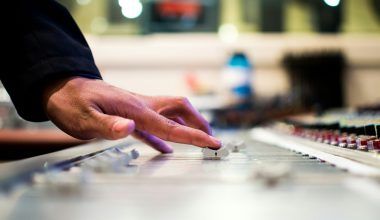Why Your Microphone Choice is Important
Have you ever tried recording your voice and felt it just didn’t sound right? Maybe it was too unclear or had too much background noise. The secret to a great recording starts with the microphone. Picking the best microphone for recording vocals is like choosing the perfect pen for writing a letter—it makes all the difference in how your story is told.
Whether you’re a singer, podcaster, or someone who just wants to sound their best, this guide is here to help. You don’t need to be an expert to understand this stuff—just someone who wants clear, warm, and professional recordings. Let’s dive into the world of microphones and find the perfect one for you!
Why Does a Good Microphone Matter?
Your microphone is the first step in the recording process. A good mic doesn’t just capture your voice—it captures your personality, your emotions, and all the little details that make your sound unique. On the flip side, a bad mic can ruin even the best performance. Here’s why having the best microphone for recording vocals is a game-changer:
- Clarity: It ensures your voice sounds crisp and professional.
- Background Noise: A good mic reduces unwanted sounds, like fan noise or echoes.
- Expression: Captures the depth and emotion of your voice perfectly.
Think of it like photography: the microphone is your camera, and your voice is the subject. You want every detail to shine.
Types of Microphones: Which One is Right for You?
There are three main types of microphones you’ll come across. Each one has its own strengths. Let’s break them down in simple terms:
1. Dynamic Microphones
These are like the workhorses of the microphone world. They’re tough, reliable, and handle loud sounds like a pro.
- Best For: Live performances and beginner recordings.
- Examples: Shure SM58, Sennheiser e835.
- Why Choose This?: It’s affordable and durable, perfect if you’re just starting out.
2. Condenser Microphones
These are the golden standard for studio recordings. They’re super sensitive and pick up even the tiniest details in your voice.
- Best For: Studio recordings where clarity matters.
- Examples: Audio-Technica AT2020, Rode NT1-A.
- Why Choose This?: Perfect for capturing soft, emotional vocals.
3. Ribbon Microphones
Ribbon microphones have a vintage feel to them. They give your voice a warm, smooth sound that’s great for jazz or classical music.
- Best For: Specialty recordings where warmth is key.
- Examples: Royer R-121, AEA R84.
- Why Choose This?: If you want a rich, old-school sound, this is it.
Key Features to Look for in the Best Microphone for Recording Vocals
When choosing your microphone, it’s important to know what to look for. Here are some simple things to consider:
1. Polar Pattern
This is a fancy way of saying “where the microphone listens.”
- Cardioid: Focuses on your voice and ignores background noise.
- Omnidirectional: Picks up sound from all directions (great for group recordings).
- Figure-8: Captures sound from the front and back, perfect for duets.
2. Frequency Response
Think of this as the microphone’s “ears.” A flat frequency response captures your voice naturally, while some mics boost certain tones to make your voice stand out.
3. Build and Connectivity
- Durability: If you plan to travel with your mic, choose a sturdy model.
- USB vs. XLR: USB mics are plug-and-play, great for beginners. XLR mics require extra equipment but offer better sound quality.
Best Microphones for Recording Vocals: Our Top Picks
Now that you know the basics, here are some top microphones to consider. We’ve sorted them by budget, so there’s something for everyone.
Budget-Friendly Options
1. Audio-Technica AT2020
- Price: ₹8,000–₹12,000
- Why It’s Great: Affordable with excellent clarity. Perfect for home studios.
2. Samson C01
- Price: ₹5,000–₹8,000
- Why It’s Great: Solid build and great sound quality for the price.
Mid-Range Options
1. Rode NT1-A
- Price: ₹18,000–₹22,000
- Why It’s Great: Known for low noise and amazing versatility.
2. Blue Yeti
- Price: ₹14,000–₹18,000
- Why It’s Great: USB connectivity, multiple polar patterns, and perfect for podcasts.
High-End Options
1. Neumann TLM 103
- Price: ₹80,000+
- Why It’s Great: Studio-grade clarity and low noise. Ideal for professionals.
2. Shure SM7B
- Price: ₹35,000–₹50,000
- Why It’s Great: Rich, warm sound. Great for vocals and even podcasting.
Tips for Setting Up Your Microphone
Even the best microphone for recording vocals needs to be set up properly. Here are a few simple tips:
- Positioning: Place the mic at mouth level, about 6–12 inches away.
- Pop Filter: Always use a pop filter to avoid harsh “P” and “S” sounds.
- Acoustic Treatment: Use foam panels or a reflection filter to reduce room echoes.
Taking Care of Your Microphone
Your microphone is an investment, so take care of it. Here’s how:
- Keep it Clean: Wipe it down with a soft cloth after every use.
- Store It Safely: Use a case to avoid dust and accidental damage.
- Avoid Moisture: Don’t let saliva or humidity damage the internal parts.
FAQs: Clearing Up Common Doubts
1. Can I Use Any Microphone for Recording Vocals?
You could, but not all mics are created equal. A good vocal mic makes a big difference in sound quality.
2. Do I Need Extra Equipment?
If you’re using an XLR microphone, you’ll need an audio interface. USB microphones don’t require extra gear.
3. How Much Should I Spend?
It depends on your needs. For beginners, ₹5,000–₹15,000 is a good range. Professionals might spend ₹30,000 or more.
Final Thoughts: Which Microphone is Right for You?
Choosing the best microphone for recording vocals doesn’t have to be overwhelming. Start with what you need: Are you a beginner, or do you want studio-quality recordings? Think about your budget, how you’ll use the mic, and what sound you’re after.
Remember, even the best microphone won’t sound good if it’s used poorly. So take time to learn about placement, settings, and care. With the right mic and a little practice, you’ll be recording like a pro in no time!
Related Articles:
For further reading, explore these related articles:
- Unlock the Secret to Earn Money with Music
- The Ultimate Guide to Choosing the Best Sound Quality Format
- How to Start a Record Label – Your Simple Guide to Success
For additional resources on music marketing and distribution, visit Deliver My Tune.





